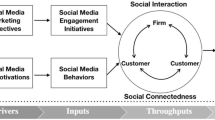Abstract
Advertising and other forms of promotional activity have proliferated to such an extent that they may constitute a form of social pollution (Kitchen, 1994). The quantity and tone of communications to which consumers are exposed may have a subtle but pervasive effect on the social ecology of the developed world. Not only are Marketing Communications delivered in unprecedented quantities (Kitchen, 1994); but their tone is increasingly difficult to categorise in the Postmodern Marketing era (Brown, 1994). Notably, there has been very little research conducted on this seeming "Leviathan" (Kitchen, 1994, after Hobbes, 1651) effect. Ethical concerns of professional marketing bodies such as the MRS and CIM are focussed on the conduct of professionals with regard to law and notions of moral decency in human exchange relationships (see MRS code of conduct, ASA and IBA guidelines). There is less emphasis on the ethical implications for society of the totality of Marketing Communication activities. This paper examines the distinctively Postmodern concept of the Communications Leviathan and discusses contemporary ethical issues, drawing perspectives where possible from Postmodern critical theory, Enlightenment philosophy, cognitive psychology and classical ethical works of Plato and Aristotle.
Similar content being viewed by others
References
Aristotle: Reprint 1976, Ethics, trans. J. A. K. Thomson (Penguin Classics).
Broadbent, D.: 1958, Perception and Communication (Pergammon, Oxford).
Brown, S.: 1994, ‘Marketing as Multiplex: Screening Postmodernism’, European Journal of Marketing 28(8/9), 27–51.
Burnett, M. and D. Lunsford: 1994, ‘Conceptualising Guilt in the Consumer Decision Making Process’, The Journal of Consumer Marketing 11(3), 33–44.
Callinicos, A.: 1989, Against Postmodernism: A Marxist Critique (Polity Press, Cambridge).
Derrida, J., in Norris, C.: 1991, Deconstruction: Theory and Practice (Routledge, London).
Foxall, G. R.: 1984, ‘Consumers Intentions and Behaviour: A Note on Research and a Challenge to Researchers’, Journal of the Market Research Society 26(3), 213–241.
Hackley, C.: 1988a, ‘Management Learning and Normative Marketing Theory: Learning from the Life-world’, Management Learning 29(1), pp. 91–105 (forthcoming).
Hackley, C.: 1988b, ‘Tacit Knowledge and the Epistemology of Expertise in Strategic Marketing Management’, European Journal of Marketing 35 (forthcoming).
Hackley, C.: 1998c, ‘The Communications Process and the Semiotic Boundary’, in P. J. Kitchen (ed.), Marketing Communications: Principles and Practice, Ch. 9 (International Thomson), forthcoming.
Hackley, C.: 1998d, ‘Mission Statements as Corporate Communications: The Consequences of Social Constructionism’, Corporate Communications 3 (forthcoming).
Hackley, C. and P J. Kitchen: 1998, ‘Integrated Marketing Communications: A Consumer Psychological Perspective’, Marketing Intelligence and Planning (forthcoming).
Hackley, C. and P. J. Kitchen: 1997, ‘Ethical Concepts for a Phenomenology of Marketing Communications’, in G. Moore (ed.), Business Ethics: Principles and Practice (Business Education Publishers, Sunderland), pp. 99–112.
Hobbes, T.: 1651, Leviathan: Or, the Matter, Form and Power of a Commonwealth Ecclesiastical and Civil (Paris, April, Morays Universal Library, London).
Hume, D.: 1739, A Treatise of Human Nature (Penguin Classics).
Kahneman, F.: 1978, Attention and Effort (Prentice-Hall, Englewood Cliffs).
Keller, K. L. and R. Staelin: 1987, ‘Effects of Quality and Quantity of Information on Decision Effectiveness’, Journal of Consumer Research 14(1) (September), 200–213.
Kitchen, P J.: 1994, ‘The Marketing Communications Revolution – A Leviathan Unveiled?’, Marketing Intelligence and Planning 12(2), 19–25.
Kitchen, P. J.: 1986, ‘Zipping, Zapping and Nipping’, International Journal of Advertising 5(2), 343–352.
Kotler, P.: 1988, Marketing Management, Analysis, Planning, Implementation & Control, 6th Ed., (Prentice-Hall, Englewood Cliffs, NJ).
Kuhl, J.: 1986, ‘Motivation and Information Processing’, in R. M. Sorrentine and E. T. Higgins (eds.), Handbook of Motivation and Cognition (N.Y. Guildford), pp. 404–434.
Lasch, C.: 1978, The Culture of Narcissism: American Life in an Age of Diminishing Expectations (Norton, NY).
Lyotard, J-F.: 1984, The Postmodern Condition: A Report on Knowledge (Manchester University Press).
Marx, K. and F. Engels: 1846 in C. J. Arthur (ed.): 1970, The German Ideology (Lawrence & Wishart, London).
Mill, J. S.: 1859, On Liberty, reprinted in Penguin Classics 1985.
Miller, G. A.: 1956, ‘The Magic Number Seven, Plus or Minus Two: Some Limits on Our Capacity for Processing Information’, Psychological Review 63, 81–93.
Newell, A. and H. Simon: 1972, Human Problem Solving (Prentice Hall, Englewood Cliffs, NJ).
Nyeck, S.: 1992, ‘Postmodernity and Consumer Pattern: A Cognitive Analysis’, in K. G. Grunert and D. Fuglede (eds.), Marketing for Europe-Marketing for the Future (EMAC, Aarhus), pp. 1371–1374.
Plato (reprint 1955), The Republic, trans. D. Lee, (Penguin Classics).
Plato (reprint 1960), Gorgias, trans. W. Hamilton, (Penguin Classics).
Pollay, R. W.: 1986, ‘The Distorted Mirror: Reflections on the Unintended Consequences of Advertising’, Journal of Marketing 50(2).
Poster, M.: 1988, Jean Baudrillard: Selected Writings (Polity Press, Cambridge).
Rothschild, M. L: 1987, Marketing Communications (Heath, Lexington, MA).
Russell, B.: 1945, A History of Western Philosophy (Simon & Schuster)
van Raaij, W. F.: 1989, ‘How Consumers React to Advertising’, International Journal of Advertising 8, 261–273.
Venkatesh, A.: 1992, ‘Postmodernism, Consumer Culture and the Society of the Spectacle’, in J. F. Sherry and B. Sternthal (eds.), Advances in Consumer Research, Vol. xix (Association for Consumer Research, Provo, UT), pp. 199–202.
Westbrook, R. A. and R. L. Oliver: 1991, ‘The Dimensionality of Consumer Emotion Patterns and Consumer Satisfaction’, Journal of Consumer Research 18, 84–91.
Williamson, J.: 1978, Decoding Advertisements; Ideology and Meaning in Advertising (Marion Boyars, London).
Author information
Authors and Affiliations
Rights and permissions
About this article
Cite this article
Hackley, C.E., Kitchen, P.J. Ethical Perspectives on the Postmodern Communications Leviathan. Journal of Business Ethics 20, 15–26 (1999). https://doi.org/10.1023/A:1005933424439
Issue Date:
DOI: https://doi.org/10.1023/A:1005933424439




